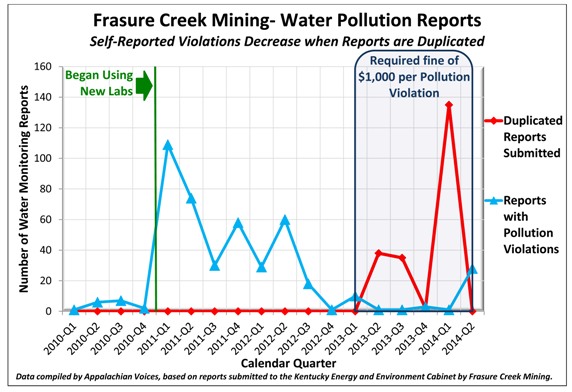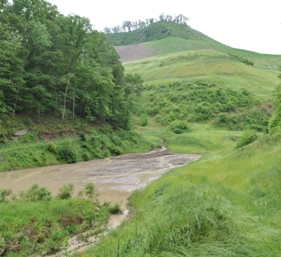They say you can’t teach an old dog new tricks. That certainly seems to be the case with Frasure Creek Mining. Four years ago we took legal action against the company for submitting false water monitoring reports, and now they are at it again, but this time the false reporting is even more extensive. Almost 28,000 violations of the Clean Water Act in what is likely the largest non-compliance of the law in its 42-year history.
In 2010, Appalachian Voices and our partner organizations served Frasure Creek and International Coal Group (ICG) with a notice of our intent to sue them for submitting falsified pollution monitoring reports to Kentucky regulators. Back then, both companies were reusing the same quarterly reports, changing the dates on the reports but duplicating all the water monitoring data. The reports have changed from paper to electronic documents, but Frasure Creek’s practice of reusing them has returned.
The Kentucky Energy and Environment Cabinet filed a slap-on-the-wrist settlement with the companies, writing off the duplications as “transcription errors” and effectively preventing our legal case from going forward. We challenged the settlement in state court and eventually reached an agreement with ICG, but not with Frasure Creek. We are still waiting on a decision in that case.
In the meantime, we discovered that Frasure Creek has been up to its old tricks. So today, we sent the company another notice of intent to sue for the new batch of duplicated reports.
Before our initial legal action, the companies rarely, if ever, submitted reports that showed violations of their pollution limits. As a result of our investigation, the companies hired new, more reputable labs and began reporting lots of pollution problems, making it clear that their false reports were covering up serious issues. We tried to sue Frasure Creek for these pollution violations, but the state reached another deal with the company, tying our hands.

Frasure Creek Mining reports only a few violations of their pollution limits when they are turning in false reports.
All of this raises one important question: Who would be stupid enough, or so utterly disdainful of federal law, to do the exact same thing they had gotten in trouble for before? One would think that it must have been an accident, because no one would ever purposefully do this again, but there are a few factors that seem to contradict that idea.
• In 2014, when Frasure reused data, it occasionally changed a little bit more than just the dates. There are a number of new duplications where the original report showed violations of pollution limits. All of the data in these reports was reused except for violations, which were replaced with a few very low numbers. (Personally, I am really looking forward to the convoluted tale that Frasure will tell to try to explain away these as “transcription errors.”)
• The new duplications are far too common to be made accidentally by someone who was putting any modicum of effort into their job. In the first quarter of 2014, the company submitted over 100 duplicated reports, so almost half of its reports that quarter were false. That’s almost three times the number of false reports it got caught for the first time around, and translates to almost $1 billion in potential fines.
• Frasure Creek isn’t afraid of getting caught because the consequences are extremely low. The state’s past settlements with the company have been too weak to discourage this type of false reporting, and in fact, may have given the company a sense of security. Under the Clean Water Act, the potential maximum fine per violation is $37,500. One of the state’s past settlements with Frasure Creek set automatic penalties of only $1,000 per violation. So interestingly, it’s when those penalties were in effect that Frasure Creek, submitted lots of duplicated reports, but only reported a handful of pollution violations. (See the period in the blue box on the graph.)

This is one of about 70 Frasure Creek Mining discharges that the company has been submitting duplicated water monitoring reports for.
Frasure Creek has about 60 coal mining permits across Eastern Kentucky, mostly for mountaintop removal mines. Most of the new reporting duplications occurred at mines in Floyd County, but some occurred at its mines in neighboring counties. Pollution from these mines flows into the Big Sandy, Licking and Kentucky rivers.
Frasure Creek may be a bad actor in the mining industry, but it’s not alone in this type of false reporting. A few years ago we took legal action against the three largest coal producers in Kentucky (including Frasure Creek), all of which were turning in false water monitoring reports produced by three different laboratories. In recent weeks there have been two criminal cases in West Virginia for false water monitoring, one at coal mines, and one for duplicating reports exactly like what has been going on here.
These pollution reports are the foundation of the Clean Water Act regulations. Without accurate reporting, it’s impossible for regulators to effectively protect the people and the environment from dangerous pollution. The fact that the Kentucky Energy and Environment Cabinet and the Environmental Protection Agency have done so little to stamp out false reporting in Kentucky is simply deplorable.
Appalachian Voices is joined in this effort by Kentuckians For The Commonwealth, Kentucky Riverkeeper, and the Waterkeeper Alliance. The groups are represented by Mary Cromer of Appalachian Citizens Law Center, attorney Lauren Waterworth, and the Pace Law School Environmental Litigation Clinic.
>> View The Notice of Intent to Sue here (.pdf)
>> View our Press Release here




Leave a Reply